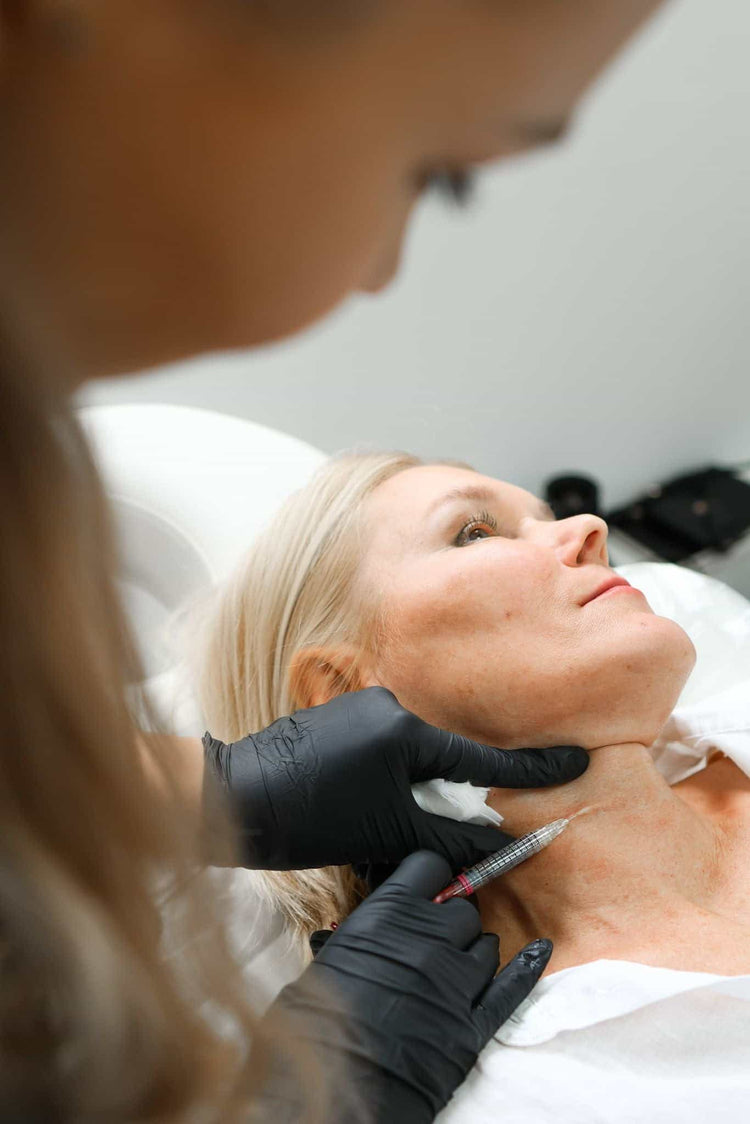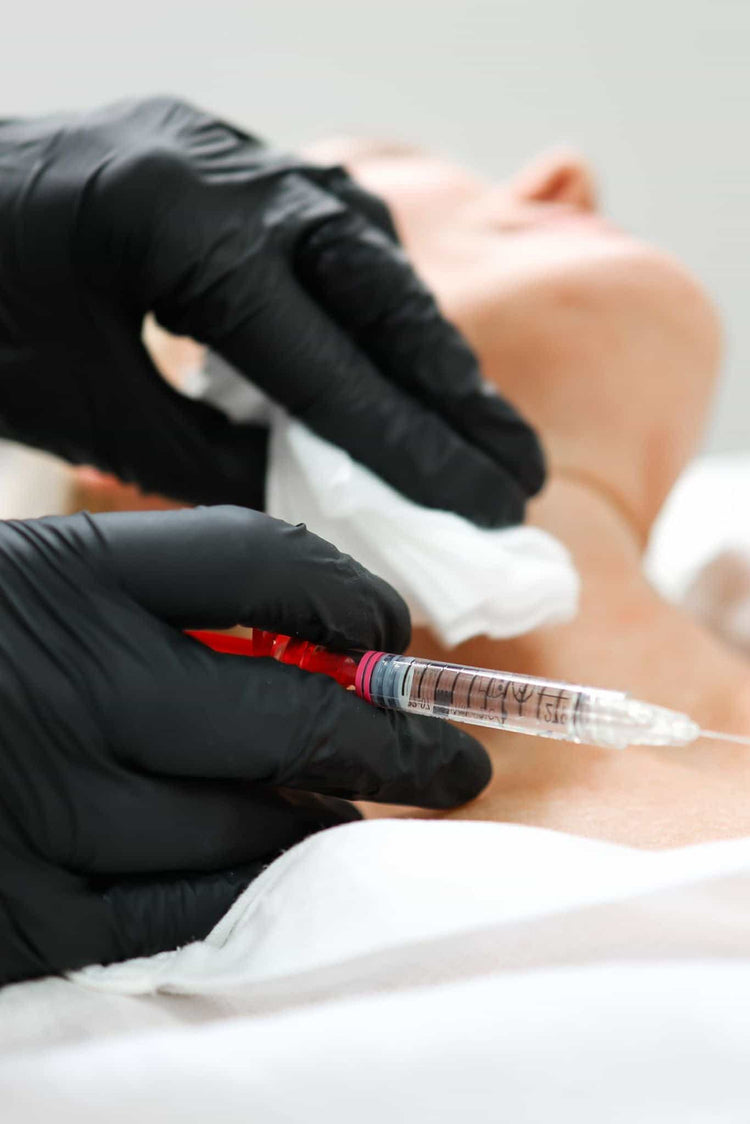The Process
Considered a minimally invasive cosmetic procedure, neckline fillers offer a solution for addressing signs of aging on the jawline and neck. This non-surgical treatment utilizes dermal fillers, primarily composed of hyaluronic acid, to restore volume and smoothness to the area, combating the effects of gravity and time.
Consultation
The process of receiving neckline fillers in Kingston Upon Thames typically begins with an initial consultation. During this consultation, a qualified practitioner will assess your individual needs and goals, taking into account factors such as your skin type, existing facial structure, and desired outcomes. They will discuss the potential benefits and risks associated with the procedure, as well as answer any questions you may have.
On the day of the treatment, a local anesthetic is applied to numb the area around the injection sites. The practitioner will then carefully inject the dermal filler along the jawline and neck, strategically targeting areas where volume loss or laxity is most prominent.
The procedure itself is relatively quick, usually taking only 30-60 minutes. You can typically resume your normal activities immediately afterward, although some mild swelling and bruising may occur for a few days. Full results are usually visible within a few weeks as the filler settles into its final position.
Procedure
Neckline fillers are a minimally invasive cosmetic procedure that addresses signs of aging on the jawline and neck. The process begins with an initial consultation, where a qualified practitioner assesses your individual needs and discusses the potential benefits and risks of the treatment.
On the day of the treatment, local anesthetic is applied to numb the area, and the practitioner carefully injects dermal filler along the jawline and neck, targeting areas of volume loss or laxity.
The procedure is relatively quick, typically lasting 30-60 minutes. Mild swelling and bruising may occur for a few days after treatment, but you can usually resume your normal activities immediately. Full results are visible within a few weeks as the filler settles.
Numbing
Neckline fillers offer a solution to combat signs of aging on the jawline and neck. These minimally invasive cosmetic treatments use dermal fillers, primarily hyaluronic acid, to restore volume and smoothness to the treated area.
The process begins with an initial consultation where a practitioner assesses your needs and goals. They discuss potential benefits and risks, taking into account factors like skin type, facial structure, and desired outcomes.
On treatment day, a local anesthetic numbs the area around injection sites. The practitioner then carefully injects dermal filler along the jawline and neck, targeting areas of volume loss or laxity.
The procedure is relatively quick, usually lasting 30-60 minutes. Mild swelling and bruising may occur for a few days, but you can typically resume normal activities immediately. Full results become visible within a few weeks as the filler settles into its final position.
Injection Technique
Neckline fillers are a minimally invasive cosmetic procedure used to address signs of aging on the jawline and neck.
- The process begins with an initial consultation where a qualified practitioner assesses your individual needs and goals. They will discuss the potential benefits and risks of the treatment, taking into account factors such as your skin type, existing facial structure, and desired outcomes.
- On the day of the treatment, a local anesthetic is applied to numb the area around the injection sites. The practitioner will then carefully inject dermal filler along the jawline and neck, strategically targeting areas where volume loss or laxity is most prominent.
- The procedure itself is relatively quick, usually taking only 30-60 minutes. You can typically resume your normal activities immediately afterward, although some mild swelling and bruising may occur for a few days. Full results are usually visible within a few weeks as the filler settles into its final position.
Aftercare Instructions
After undergoing neckline fillers, it’s essential to follow certain aftercare instructions to ensure optimal results and minimize any potential complications.

Avoid touching or rubbing the treated area for at least 24 hours to prevent irritation and allow the filler to settle properly.

Apply cold compresses to reduce swelling and discomfort, if needed, for the first few days after the procedure.
Refrain from engaging in strenuous activities or exercise for at least a week to minimize strain on the treated area.
Avoid direct sun exposure and UV radiation for several weeks, as it can affect the filler and cause discoloration.
Continue using sunscreen daily with an SPF of 30 or higher to protect your skin from further sun damage.
If you experience any unusual symptoms, such as excessive swelling, redness, pain, or infection, contact your practitioner immediately.
Recovery and Results
Neckline fillers offer a minimally invasive solution for addressing signs of aging on the jawline and neck. Utilizing hyaluronic acid-based dermal fillers, this treatment restores volume and smoothness, combating the effects of gravity and time.
Timeline
Neckline filler treatments are designed to combat visible signs of aging around the jawline and neck. The process typically begins with a consultation where a practitioner assesses your individual needs and discusses potential outcomes. During the procedure itself, local anesthetic is administered to numb the area. Dermal filler is then carefully injected along the jawline and neck, targeting areas where volume has been lost or skin laxity is present.
Recovery from neckline fillers is generally quick. You can usually resume most normal activities immediately following the treatment. Some mild swelling or bruising might occur in the days following the procedure, but this typically subsides quickly. Full results become visible within a few weeks as the filler settles into its final position.
Possible Side Effects
Neckline fillers offer a minimally invasive solution to address signs of aging around the jawline and neck. Using hyaluronic acid-based dermal fillers, these treatments restore volume and smoothness, combating the effects of gravity and time.
Recovery from neckline fillers is generally quick. You can usually resume most normal activities immediately following the procedure. Mild swelling or bruising might occur in the days following treatment but typically subsides within a few days. Full results become visible within a few weeks as the filler settles into its final position.
Possible side effects of neckline fillers are generally mild and temporary. These can include swelling, redness, bruising, tenderness, and itching at the injection sites. In rare cases, more serious side effects like infection or allergic reactions can occur. It’s crucial to discuss any concerns with your practitioner before undergoing treatment.
Long-Term Effects
Recovery from neckline fillers is typically quick and straightforward. Most patients can resume their normal activities immediately after the procedure. However, some mild swelling and bruising may be present for a few days following the treatment. These side effects are generally temporary and subside within a week.
Long-term results from neckline fillers can last anywhere from 6 to 18 months, depending on individual factors such as metabolism, lifestyle, and the type of filler used. As hyaluronic acid is naturally broken down by the body over time, repeat treatments are often required to maintain the desired results.
Choosing a Practitioner
Choosing a practitioner for neckline fillers is an important step in ensuring a safe and successful outcome.
Qualifications
When selecting a practitioner for neckline fillers, it’s crucial to prioritize qualifications and experience. Look for a practitioner who is a licensed medical professional with specialized training in cosmetic injectables. This could include a doctor (MD or DO), dermatologist, plastic surgeon, or nurse practitioner.
Inquire about their experience performing neckline filler treatments, the specific types of fillers they use, and their understanding of facial anatomy and aging processes.
It’s also beneficial to review before-and-after photos of previous patients to gauge the practitioner’s aesthetic style and skill level.
Don’t hesitate to ask questions about their training, certifications, and any potential risks or complications associated with the procedure.
Experience
Choosing a practitioner for neckline fillers is an important step in ensuring a safe and successful outcome. When selecting a practitioner, prioritize qualifications and experience. Look for a licensed medical professional with specialized training in cosmetic injectables, such as a doctor (MD or DO), dermatologist, plastic surgeon, or nurse practitioner.
Inquire about their experience performing neckline filler treatments, the specific types of fillers they use, and their understanding of facial anatomy and aging processes. Reviewing before-and-after photos of previous patients can help you gauge the practitioner’s aesthetic style and skill level. Don’t hesitate to ask questions about their training, certifications, and any potential risks or complications associated with the procedure.
Reviews
Choosing a practitioner for neckline fillers is crucial for a safe and successful outcome.
Prioritize qualifications and experience when selecting a practitioner. Look for a licensed medical professional specializing in cosmetic injectables. This could include a doctor (MD or DO), dermatologist, plastic surgeon, or nurse practitioner. Inquire about their experience with neckline filler treatments, the specific types of fillers they use, and their knowledge of facial anatomy and aging processes.
Reviewing before-and-after photos of previous patients can help you assess their aesthetic style and skill level. Don’t hesitate to ask questions about their training, certifications, and any potential risks or complications associated with the procedure. Reading online reviews can also provide valuable insights into other patients’ experiences.
- Why CBD Gummies Are A Great Option For People With Busy Lives - November 13, 2025
- What Are The Benefits Of CBD Gummy Edibles For Overall Health - November 8, 2025
- Understanding How CBD Gummy Sweets Work - November 5, 2025
